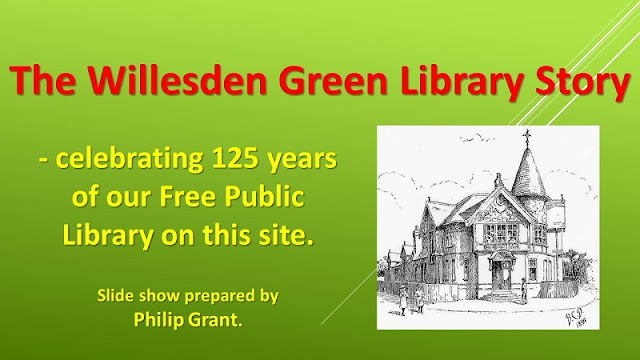Guest post by Philip Grant
It’s
not often that you get invited to a 125th birthday party, but that
is what is happening on Thursday 18th July, a century and a quarter
to the day from the opening of Willesden Green Library in 1894.
Live
music; in a library!? Well, that’s just what happened on the evening of 18th
July 1894. The choice of music may be different now, but this was the concert programme
then:
Public libraries were something
new in Victorian times, and local Councils had to get special approval from
their ratepayers before they could raise an extra penny in the pound to be
spent on providing them. There was quite a battle in the correspondence column
of the “Willesden Chronicle” over the issue in February 1891.
An anonymous letter, headed
“Proposed Pauper Libraries for Willesden Parish”, gave some of the arguments
against:
‘Acquiring a taste to waste time reading foolish and frivolous
literature may be less bad than acquiring a taste for some habits of a more
actively vicious description. Nevertheless it is very much the reverse of
desirable.’ … and:
‘It
should be remembered that desirable residents are apt to select a parish, and
become ratepayers, because the rates are low compared with those of other
parishes, and not because the parish luxuriates in a free library at the
expense of the ratepayers.’
A local
vicar, and Chairman of the Willesden School Board, replied:
‘It is easy to nickname these places “Pauper
Libraries”, but they are no more pauper than our public parks, or our street
gas, or the public promenades at seaside resorts.’
… and:
‘People must have recreation, and a certain
degree of excitement. If they do not take it out in poetry and fiction, they
will have it in drinking and gambling.’
W.B.
Luke, a local councillor and leading campaigner for a “Yes” vote in the poll,
wrote:
‘The time has come for a recognition of the
higher duty, to humanise and elevate the thousands who throng our tenement
dwellings, and to make intelligent citizens of the children who leave the
elementary schools only to graduate in the university of the gutter.’
Education*, and helping the large proportion of
the local community who were in the working class to better themselves, through
access to reading material they could not afford to buy for themselves and
their families, was a key aim of free public libraries. The ratepayers of
Willesden voted by 2,257 to 1,070 in favour of paying more rates to
provide one for each of the three main districts of Harlesden, Kilburn and
Willesden Green.
*[It should be remembered that
free elementary education for all children had only been introduced as recently
as the 1870 Education Act. The “Board Schools” only provided a basic education,
often described as “The Three R’s” – Reading, Riting and Rithmetic (perhaps
spelling wasn’t on the curriculum, because it didn’t begin with an “R”!)]
The
origin of our free public libraries is part of an illustrated local history
talk (from 5pm) which forms part of the 125th anniversary programme.
It then goes on to cover developments through the whole 125 years, including
some more battles along the way. I have prepared the powerpoint slide show,
although I will not actually be able to present it on 18th July (it
will be in the capable hands of a friend from Brent Museum & Archives).
So how
did I, a “Wembley” local historian, get involved with the history of Willesden
Green Library? It all began when I was asked to take part in a focus group in
February 2011, as a user of the Museum & Archives, about the future of the
then Willesden Green Library Centre. Brent’s Regeneration Department were
putting forward “options” for dealing with what they considered to be a sub-standard
building, and rather than repair or refurbishment, their preferred option was
to get a private developer to build a new Brent Council "hub",
including a library, on the site. Everyone in our group (and, I discovered
later, in a second group of library users) said that if this option was the one
chosen, the remaining part of the 1894 building should be retained as part of
the new library.
Many of
you will remember the battle that took place in 2012 and early 2013, after our
views on retaining the Victorian building were ignored. If you weren’t around
at the time, you will find plenty of articles about it in the “Wembley Matters”
archive for those years! I researched the history of the library as part of
making the heritage case for retaining the 1894 frontage, which Brent and its
development partner wanted to demolish. A great community effort achieved that in
the end, and today’s “The Library at Willesden Green” includes the original
library’s face on the High Road.
Luckily,
I still had my research material available when plans for the 125th
anniversary were being drawn up a few months ago. If you can’t get to the talk,
“The Willesden Green Library Story” will soon be available to read or download
from the Brent Archives website, at: LINK Just
click on the “local history articles” link from the home page to find a varied
menu of illustrated local history material.
Things
may have changed since Victorian times, but I believe our free public libraries
are still something to be valued, used and supported. I’m confident that many
“Wembley Matters” readers will agree with that.
Philip Grant.





